102 CD / Robert Schumann: Sämtliche Streichquartette
Description
"They took their name from the amulet in Michael Ende’s “Neverending Story”, and their playing is equally intuitive, secretive, spiritual and polished when they perform the three string quartets by Schumann. The Auryn Quartet has been established at the top of international quartets for almost twenty years now, and this recording is once more a masterpiece of select, well-balanced quartet art." (Abendzeitung)
10 reviews for 102 CD / Robert Schumann: Sämtliche Streichquartette
You must be logged in to post a review.


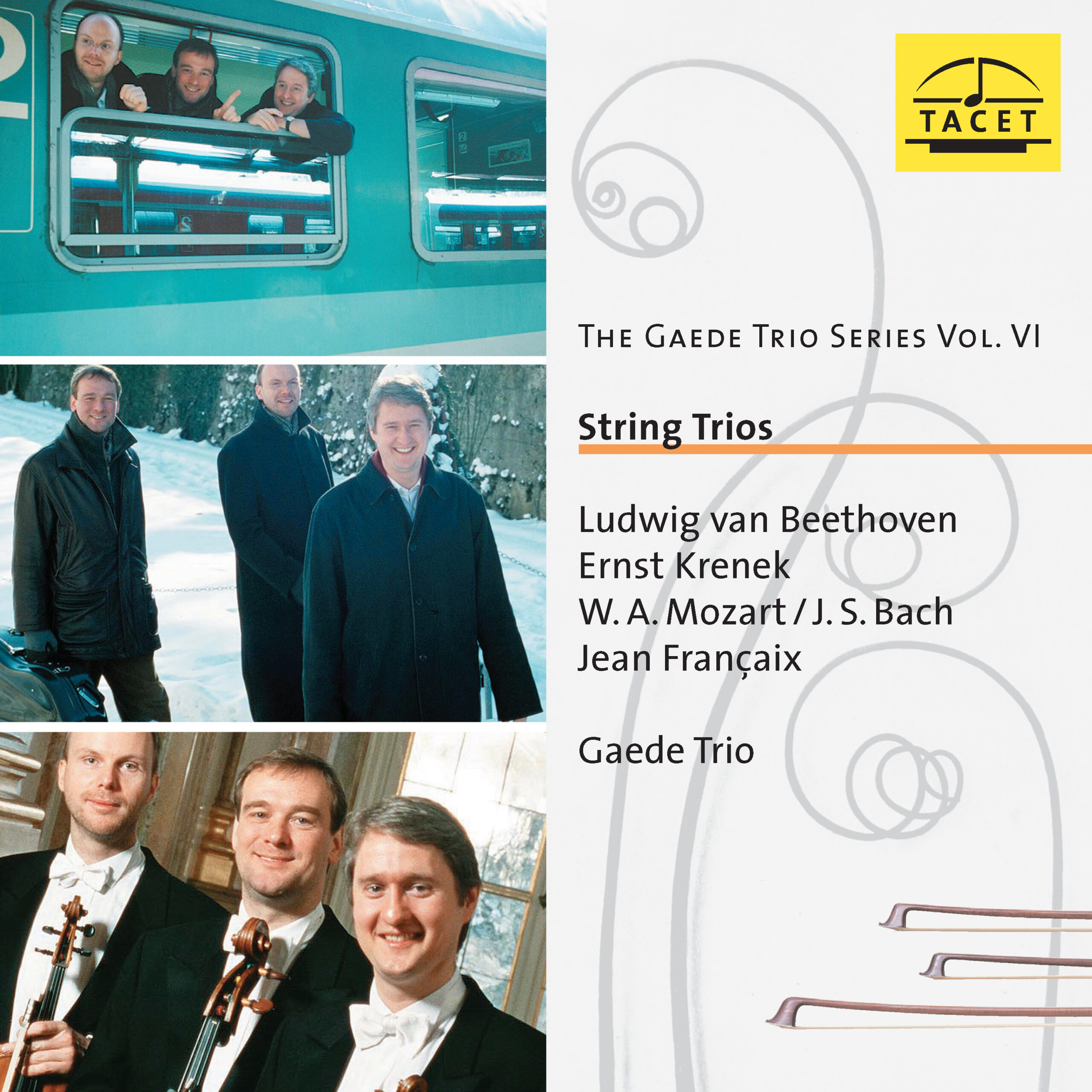
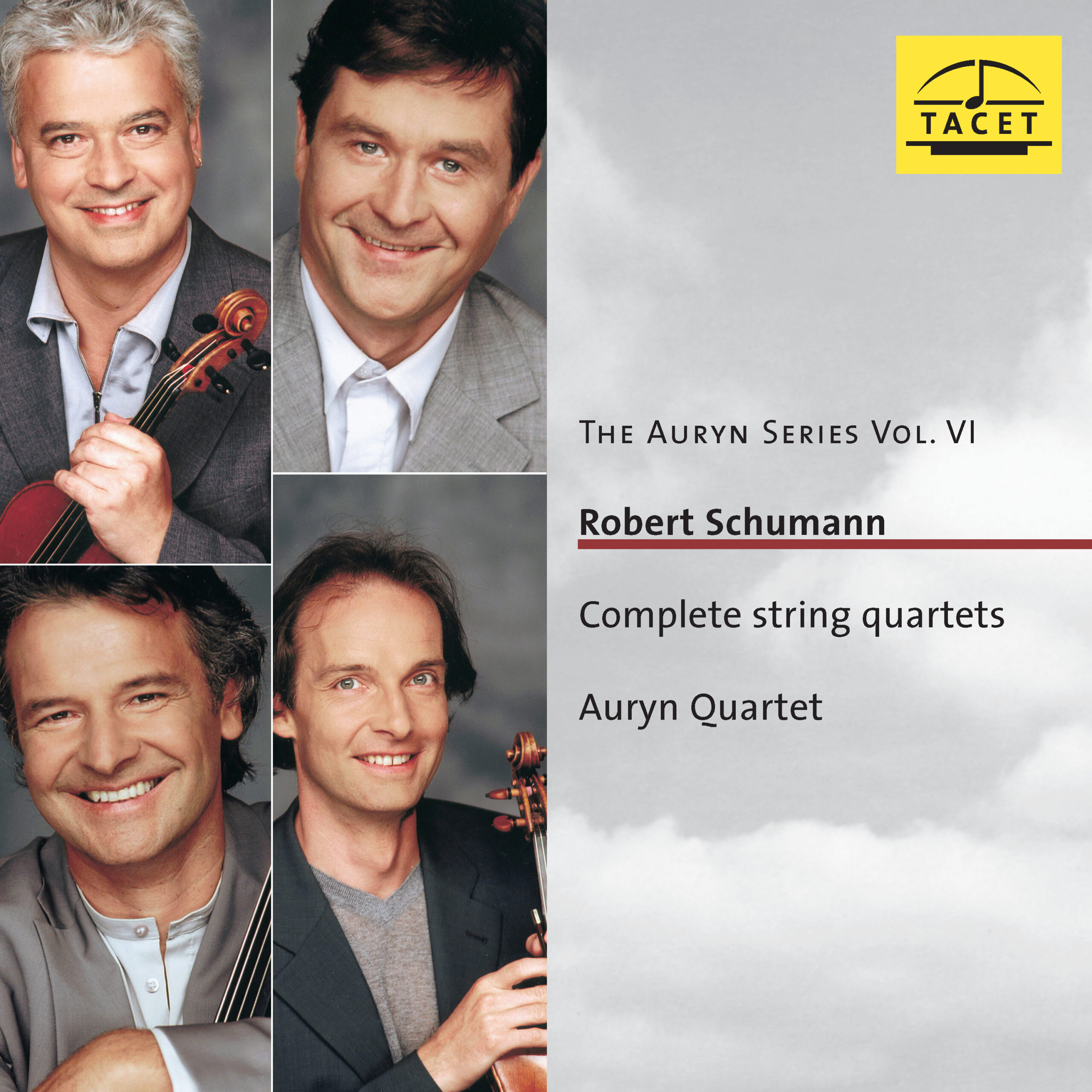
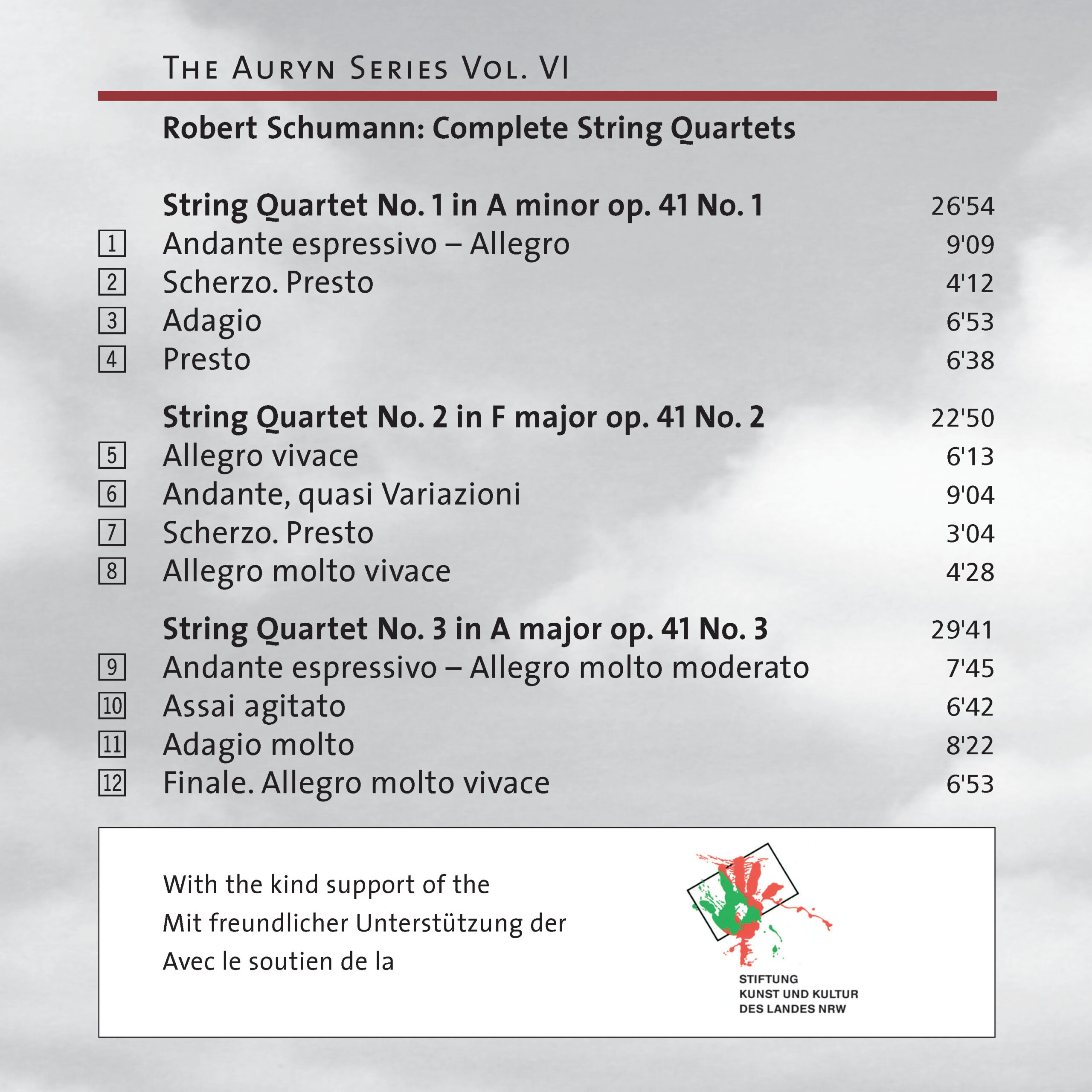
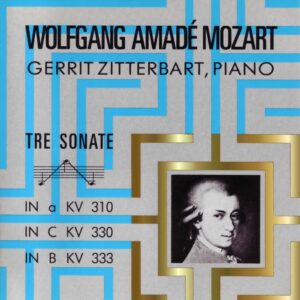
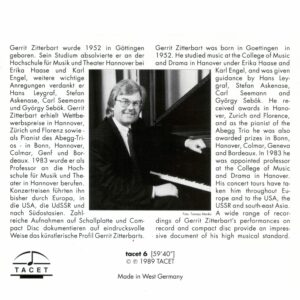
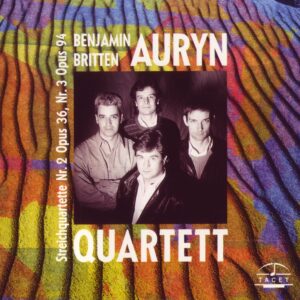
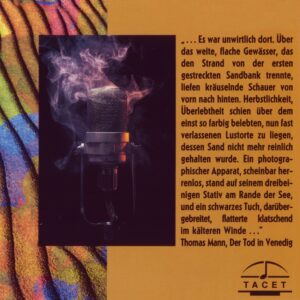
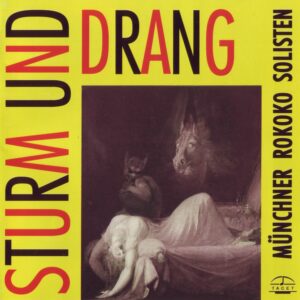

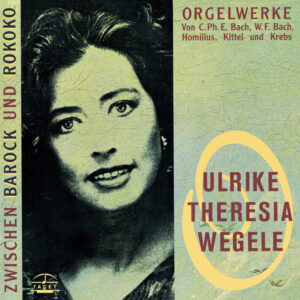



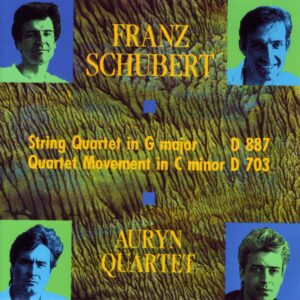

Die Woche –
Among Germany’s world-class young string quartets, the Auryn Quartet stands out as one of the most remarkable: its four musicians discover new composers and rediscover familiar ones—like Schumann. While he is famous as a song composer, until recently, few knew him as a symphonist. And Schumann as the creator of three string quartets that defy the stereotype of the "botched neo-Romantic," instead offering tenderness and melody? Never heard of it. But that is about to change: in the Auryn Quartet’s recording, Schumann reaches Beethoven’s level—though without his harsh radicalism. Music to melt by.
Stefan Siegert
Ludwigsburger Kreiszeitung –
A thrilling listening experience
Complete Schumann recording with the Auryn Quartet
They’ve just performed one of their two anniversary concerts at Cologne Philharmonic. Matthias Lingenfelder, Jens Oppermann, Stewart Eaton, and Andreas Arndt have been playing together for 20 years, ever since they united under the unusual name "Auryn"—inspired by the amulet from Michael Ende’s The Neverending Story. Today, they rank among the most internationally renowned string quartets of their generation. A handful of recordings have already been released under Stuttgart’s TACET label, celebrated by connoisseurs for its sophisticated microphone technique, including two Haydn CDs that are just the beginning of a complete recording of all Haydn string quartets, set for completion by the 2009 anniversary year. Now, on a single TACET CD, the Auryn Quartet has released Robert Schumann’s three String Quartets, Op. 41. This complete recording showcases all the strengths of this ensemble.
With a robust, rhythmically incisive approach—sometimes almost brusque and entirely free of false sentimentality—the Auryn Quartet explores the depths of Schumann’s scores, where expressive unity and impulsive interplay combine to create a captivating listening experience. The highly nuanced phrasing and dynamics, as in the variation movement of the F-major Quartet, the fiery emotionality of the A-minor Quartet, and the harmonic serenity of the A-major Quartet are defining features of this outstanding production. Also new from TACET are Johann Sebastian Bach’s six Brandenburg Concertos, performed by the Stuttgart Chamber Orchestra on a double CD (also available in quadrophonic DVD "real surround sound"). Though the Stuttgart ensemble, under their new chief conductor Dennis Russell Davies (since 1995), has successfully built on its Münchinger-era reputation in both classical-romantic and modern repertoire, this Baroque recording presents an interesting compromise between historical performance practice and contemporary sound aesthetics.
TACET founder and recording engineer Andreas Spreer has done outstanding work.
Deutschlandfunk –
...There may be no quartet today that, like the Auryns, can make music begin in such a way that it seems to have already begun before it even starts...
Facts –
The Works: Robert Schumann composed his only string quartet cycle in just two months of 1842. It is characterized by a free approach to sonata form and, above all, by constant rhythmic and metric irregularities.
The Interpretation: The ensemble might as well be called the Auryn Quintet—so long and so intensely have the four string players collaborated with sound engineer and TACET label owner Andreas Spreer. Using Neumann tube microphones, Spreer creates a sound image of seductive sensuality and warmth. Founded 20 years ago in Cologne, the quartet uncompromisingly prioritizes expression. Here, accents can be rough and percussive, melodies fragile and vulnerable, for beneath it all lies a burning emotionality. Unpretentious, unsentimental, yet honest and deeply felt, these musicians tell stories you cannot help but believe.
Stereo –
Robert Schumann’s quartets do not enjoy the highest favor with audiences. Perhaps this is because Felix Mendelssohn was not entirely wrong in his assessment that they are essentially magnificent piano sonatas arranged for strings. The Auryn players, however, master the intimate art of quartet playing. The artistic seriousness cultivated over their 20 years of playing together is evident in their romantically inspired interpretations of Schumann’s quartets. The awkward syncopations emphasized by the composer are brought to life with transparent, technically flawless playing. The note-dense finale of Op. 41, No. 1, with its cumbersome runs, is made accessible through the group’s energetic approach. With a keen instinct for Schumann’s idiom, the Auryns develop a sound landscape—particularly in the relaxed, atmospheric character of the often-neglected F-major Quartet, Op. 41, No. 2. Their advocacy for Schumann, the somewhat overlooked quartet composer, is convincing even to skeptics. Artistically highly refined is also the interpretation by the Eroica Quartet. With a lean, exceptionally fluid phrasing on period instruments, they create a seductive cantabile. The performance avoids any emotionally charged intrusiveness. Intimacy, rigor, and persuasiveness are undeniable in this rendition.
Egon Bezold
Rheinische Post –
Schumann had no desire to make even the smallest mistake. He wanted to approach the string quartet, but Beethoven, Mendelssohn, Mozart, and Haydn loomed over him like threatening gods. Then he had a brilliant idea: he invited musicians from the Leipzig Gewandhaus Orchestra to his home to play through their repertoire for him—followed by drinks. By 1842, so many ideas had gathered in his mind that he wrote down the three Quartets, Op. 41, in one go, immediately arranged a rehearsal with those Gewandhaus players, and then made countless corrections, retouches, and revisions. The wildest autographs emerged—some passages were so compositorially intricate that they nearly crossed into unplayability.
This rhythmic-contrapuntal density is a blessed terror for the uninitiated. But the Auryn Quartet has now immersed itself in this seemingly effortless yet dazzlingly precise art with fabulous accuracy. There’s grainy, exuberant joy in playing (Finale of the F-major Quartet), dramatic rigor (the A-minor work), tranquil warmth (Adagio of the A-major Opus)—and the graceful fury of the absolute. A reference recording.
Wolfram Goertz
Klassik heute –
Among the few currently available complete recordings of Schumann’s three quartets, this one stands out with its very natural spatial clarity, rich and transparent sound. The Auryn Quartet leaves nothing to be desired in terms of clarity, especially in the densely polyphonic passages that many find the most challenging. Everywhere, the playing is marked by great decisiveness. A weakness remains in the dynamic range from forte upward, where the sound tends to be forced in a somewhat stereotypical manner, and the balance is occasionally lost. The rhythmic execution, however, is consistently excellent, and the intonation is more precise than that of some colleagues. In the slow movements, the melodic shaping is generally more conscious and far-sighted, though the Adagio molto of the third quartet does not yet fully emerge as a completely compelling form. Otherwise, the Auryn Quartet has achieved an absolutely serious, clearly conceived recording—one that, through its precision and "objective emphasis," makes a valuable contribution to the understanding of these underrated masterpieces.
Christoph Schlüren
Neue Westfälische –
Robert Schumann’s 1842 String Quartets, Op. 41, are a mirror of his artistic and emotional turmoil. They are quartets of formal richness and virtuoso command of tonal character. The spectrum of distress, melancholy, dramatic intensity, and dreamlike balance of thought finds expression in the musical unfolding, in rhythmic and harmonic contrasts. The interweaving of voices combines with the "illumination" of motivic details, the freedom of metric groupings, emerging from the labyrinth of singularity and diversity—a cycle of works born of nervous energy, suggestion, aesthetic sublimity, and contemplation. This is reflected in the new recording by the Auryn Quartet, luminous traces of meticulous artistry in service of Schumann—moments and insights into the composer’s essence, dissolving into sound and becoming a precious gift to the listener. — Enchanting.
DS
AZ –
Amulett of Infinite Beauty
They take their name from the amulet in Michael Ende’s The Neverending Story, and their playing sounds just as intuitive, mysterious, spiritual, and brilliantly clear when they interpret Schumann’s three string quartets. For nearly 20 years, the Auryn Quartet has held its place among the elite of international quartets, and this recording is once again a masterpiece of exquisitely balanced quartet artistry.
R. S.
Diapason –
Strangely underappreciated, Schumann’s three string quartets have a modest discography compared to Brahms’s, despite being quintessentially German Romantic. They have never achieved the fame of his Piano Quintet and remain too rarely performed by today’s great quartets. Dedicated to his friend Felix Mendelssohn, the three quartets date from 1842 and encapsulate all the poetic climates of Schumann’s universe—exuberance, passion, tenderness, emotional instability marked by abrupt transitions, and above all, that distinctive melancholic hue.
The Auryn Quartet, whose remarkable complete Schubert recordings (CPO, 2001) were praised in Diapason (No. 467), now delivers what is certainly the most accomplished interpretation since the legendary 1980s Philips recording by the Quartetto Italiano. With homogeneity, eloquence, and tonal suppleness reserved for the very best, the Auryns offer a reading of these intense and moving works that is by turns ardent, dreamy, yet always extraordinarily sensitive. Their approach is meticulously crafted, their intonation flawless, and their sound both subtle and richly textured. If only a hint more whimsy were sprinkled here and there, this purified classical vision would be utterly spellbinding.
Jean-Michel Molkhou
______________________________
Original Review in French language:
Curieusement mal aimés, les trois quatuors à cordes de Schumann n′ont qu′une bien modeste discographie au regard de ceux de Brahms. Quoique très emblématiques du romantisme allemand, ils n′ont jamais connu la notoriété du Quintette avec piano et figurent encore trop rarement au repertoire des grands quatuors d′aujourd′hui. Dédiés à son ami Felix Mendelssohn, les trois quatuors datent de 1842. On y trouve tous les climats poétiques de l′univers Schumannien, l′exuberance, la passion, la tendresse, cette instabilité émotionnelle marquée par des transitions abruptes, et surtout cette teinte mélancolique si spécifique. Le Quatuor Auryn, que l′on avait entendu dans une remarquable intégrale Schubert publiée l′an dernier chez CPO (cf. Diapason no. 467), propose ici la lecture certainement la plus aboutie depuis la légendaire version du Quartette Italiano parue chez Philips il y a une trentaine d′années. Avec une homogénéité, une éloquence et une souplesse du ton qui n′appartiennent qu′aux meilleurs, les Auryn livrent de ces trois oeuvres intenses et émouvantes une lecture tantôt ardente, tantôt rêveuse mais toujours extraordinairement sensible. Le propos est minutieusement conduit, l′intonation ne connaît aucune faiblesse et les sonorités sont à la fois subtiles et genéréusement timbrées. Il ne manque qu′un soupcon de fantaisie cà et là pour faire de cette vision au classicisme épuré, une Interprétation envoûtante.“
Jean-Michel Molkhou